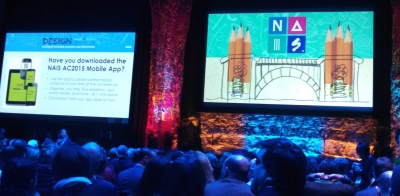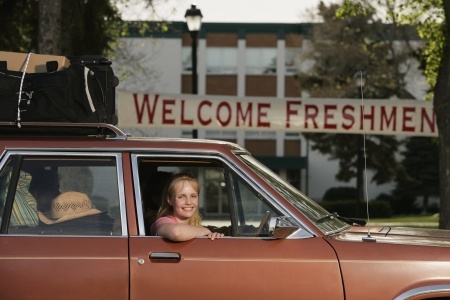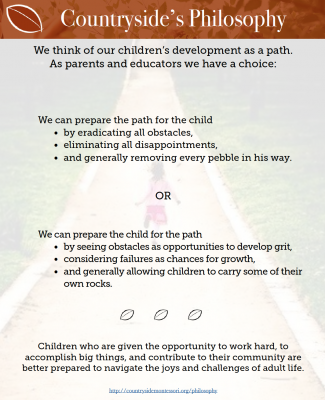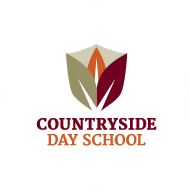(by Head of School, Wendy Calise)
Last week on Thursday and Friday, 12 of our CDS faculty and staff attended the National Association of Independent Schools’ Annual Conference. As is always the case, it was a star-studded cast, and I could go on for pages about all that we learned.
But instead, I want to focus on one particular presentation that made a strong impression on me: Panel of the Future of Education. The panelists were the Chancellor of the University of Denver; the President of York College of Pennsylvania; a political philosopher who was formerly the President of both Wellesley and Duke; and the President of Southern New Hampshire University (the largest provider of online higher education in New England). It was a powerhouse of knowledge, and they shared with us their predictions for the future of the university experience, and the current challenges they face.

Here are some takeaways:
- Higher Education is experiencing a classic industry disruption that so many other industries have experienced.
- The Internet has “democratized” access to knowledge.
- College as we know it now – a four-year boarding experience with live classes focused on the acquisition of academic content – will not look the same in ten years.
- Options that make a college degree more accessible and more affordable for many more people are already in the works.
- Colleges are moving away from ACT and SAT scores as a place to start determining who they should consider accepting. The tests are not yielding the kind of students colleges want.
- College admission officers are less impressed with extra-curriculars than they are with students who have steadily held a job.
This all seems like pretty good news. No one is predicting that the four-year on-campus experience will disappear completely, but rather there will be vast options of on campus, online, and a blend of both available.
But some news was not so good. Residential colleges are greatly challenged with the current students they are seeing.
- They do not prioritize their time
- They don’t understand how to live in community
- They do not persevere when things get tough
- They lack a general life maturity
- They are unprepared for independence
- They do not know how to write
- They don’t ask questions to help themselves
- They are unprepared to make choices
- They are less able to figure things out
- They don’t seem to know themselves
- And finally, they do not seem to understand that they have an individual, personal responsibility to build their college educational experience.
These four panelists indicated that they are less concerned about a student’s ability to qualify for college acceptance and far more concerned with a student’s ability to graduate.
Although it was discouraging to hear this consensus from these college leaders, it was deeply affirming to know that Countryside is on the right track, as a community of educators, students and parents who share a common vision and commitment to the development of strong character.
This is what we’ve been saying all along. Hence, some website excerpts:
- Lessons in the Elementary classes are always given in small groups giving each student ample opportunity to express interests, ask questions, and make meaningful contributions, thus developing a sense of educational responsibility. Children in these classes play a part in what they learn which leads to much greater engagement in school and academics.
- Mixed age PreK/K classes create an ideal environment for children to engage in academic pursuits as well as learn the critical skills of collaboration, problem solving, and creative thinking. Because they are encouraged to work independently, they build a strong sense of themselves and their enormous capabilities.
- Toddlers become responsible by participating in tasks that make a real contribution to the class community, including baking a fresh snack each day to share with friends. They become resourceful by learning how to play together, how to gather in a group, how to get a turn, how to give a turn. Teachers carefully balance modeling and offering help with allowing toddlers to make their own choices and experience the results.
Children who are given the opportunity to work hard, to accomplish big things, and contribute to their community are better prepared to navigate the joys and challenges of adult life. More on Countryside’s Philosophy.




Thank you!
Thank you for sharing this and confirming that it is our responsibility as parents, educators and mentors, to adequately prepare our kids for college and LIFE by empowering them to problem solve issues through discussions. The foundation of my work helps clients make life changing decisions by questioning and challenging inconsistencies in values, behaviors and beliefs. Most of us prefer and are hard wired to make quick, easy emotional decisions but often lack energy, experience, knowledge and grit necessary in making more complicated decisions. It is only through engaging in a question based dialog that spurs my clients in to “feeling” the reasons behind their decisions. Similarly, CMS consistently finds opportunities to “safely” encourage and challenge students to question and analyze why they are doing things, who does it affect and what are the short and long term consequences of their actions. It is CMS’s philosophy to utilize conflicting issues, problems and differing opinions as an opportunity for teaching students decision making skills of using logic and analysis over quick emotional reactions that prompted me to enroll my daughter to the school.
Leave A Comment